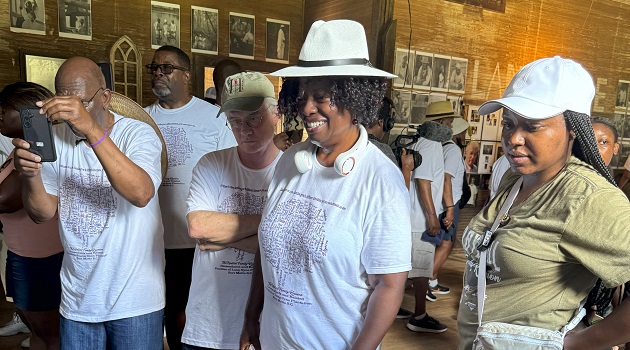By Kelly Eckstrom
I’ve heard it said that “families are forever.” Whenever people reflect on their family’s history, it’s common for them to focus on thinking back as far as their grandparents. People often remember their grandparents and the influence they’ve had on their lives. Also, people typically know where their deceased grandparents are laid to rest.
On the other hand, do people know the names and histories of their great-grandparents or know where to find their great-grandparents’ final resting place? What were their lives like? How did their great-grandparents’ lives affect their own lives?
These are questions often asked by Columbia resident Jackie Whitmore, renowned family historian and avocational genealogist. In connection with performing extensive genealogical research on his own extended family, Jackie found records of enslaved Africans who had arrived in the Fort Motte region in the 1700s, and he traced their eventual dispersal to other states in the decades that followed their emancipation. From his research, he painstakingly created an enormous extended family tree that includes two prominent Reconstruction-era state senators as well as the families of current-day distinguished descendants like state senator Darrell Jackson, state representative Jerry Govan, and recently deceased state senator John Scott.

Jackie recently arranged a “Fort Motte Family Reunion,” which took place July 4-7, 2024, with more than three hundred extended family members attending. The reunion included group visits to six historic African American cemeteries near Fort Motte where people found grave sites of deceased grandparents, great-grandparents, great-great-grandparents, and other extended family members.
At the reunion, Jackie unveiled the renovated Ben Hanes Community Center, located in the old town square of Fort Motte. This privately funded center was recently designed to replicate the appearance of Fort Motte’s long-gone train depot, which at one point stood near the spot of this replicated depot.

I created historically appropriate panels for permanent display in the Community Center. Those panels provide information that includes Fort Motte’s role in the Revolutionary War, major events in the town’s history, area neighborhoods and crossroads, and information on prominent plantations that contributed to the region’s history.
The reunion included a tour of the historic Land Syne Plantation school that had served children of African American sharecroppers from 1935 to 1957. This four-teacher school taught students from the first grade through the eighth grade. Its construction funding had been arranged by First-lady Eleanor Roosevelt who had befriended Julia Peterkin, the acclaimed Pulitzer Prize winner and Lang Syne Plantation headmistress.
Those at the reunion who had once attended the school enlightened the crowd by sharing moving memories of their classroom and schoolyard experiences. In the weeks leading up to the reunion, I created and filled the school with hundreds of period-relevant annotated photographs, artifacts, and historical displays to provide information not only on the school and its students but also on prominent plantations in the area from which the students came.
In addition to Lang Syne Plantation, another prominent plantation was the Singleton Plantation, which was later renamed True Blue Plantation in the late 1800s in reflection of the valuable indigo crops it produced. Grammy Award-winning actress Viola Davis, whose sister attended the reunion, was born on True Blue Plantation.
During the past year, dozens of students from Dutch Fork High School’s Beta Club, of which I’m the faculty advisor, provided their weekend labor to clear overgrown vegetation and underbrush from True Blue’s historic African American cemetery. They also helped find, clean, and re-stand toppled headstones that had fallen over and were inadvertently buried by time.
True Blue Cemetery is also the cemetery in which the great, great, great, great-grandfather of the internationally acclaimed artist and potter, Adebunmi Gbadebo, is interred. Adebunmi’s artwork, which has been featured in the Metropolitan Museum of Art includes indigenous pottery she created from red clay obtained in the Fort Motte area.
The Fort Motte region is a region of South Carolina where family roots truly run deep. It’s a region where family is valued. It’s clear that parents realize that to teach their offspring to value family, they as parents must set an example. That’s a heartwarming thing to see.
Kelly Eckstrom is a U.S. History teacher at Dutch Fork High School near Columbia, SC. She’s faculty advisor for the DFHS Beta Club and DFHS 2024-2025 Teacher of the Year.


